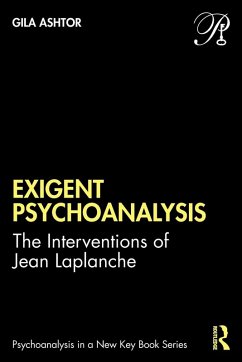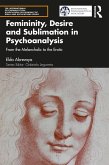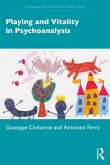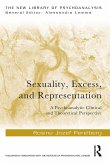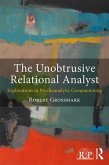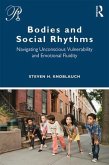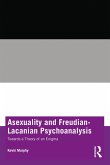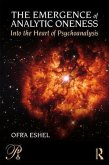Exigent Psychoanalysis: The Interventions of Jean Laplanche offers a bold exploration of the contemporary psychoanalytic field by focusing on key issues through the lens of one of this century's most exacting and invigorating psychoanalytic theorists.
Deliberately taking an integrative approach that spans a vast range of psychoanalytic ideas - with particular focus on the enduring tension between Freudian and Relational paradigms - Ashtor shows how a rigorous close reading of Laplanche's work can disrupt stale binaries and forge new possibilities for revolutionizing the foundations of psychoanalysis. Organized as pointed interventions on such topics as metapsychology, motivation, the unconscious and psychic structure, Ashtor integrates cutting edge research on Affect theory and sexuality to demonstrate the potential for fieldwide innovation.
Of interest to established and emerging clinicians alike and aimed at addressing a broad spectrum of theoretical positions, Exigent Psychoanalysis offers the first extensive clinical and theoretical study of Laplanche's work, thus facilitating a timely and cutting-edge intervention in contemporary psychoanalytic debates.
Deliberately taking an integrative approach that spans a vast range of psychoanalytic ideas - with particular focus on the enduring tension between Freudian and Relational paradigms - Ashtor shows how a rigorous close reading of Laplanche's work can disrupt stale binaries and forge new possibilities for revolutionizing the foundations of psychoanalysis. Organized as pointed interventions on such topics as metapsychology, motivation, the unconscious and psychic structure, Ashtor integrates cutting edge research on Affect theory and sexuality to demonstrate the potential for fieldwide innovation.
Of interest to established and emerging clinicians alike and aimed at addressing a broad spectrum of theoretical positions, Exigent Psychoanalysis offers the first extensive clinical and theoretical study of Laplanche's work, thus facilitating a timely and cutting-edge intervention in contemporary psychoanalytic debates.
"Exigent Psychoanalysis offers a brilliant and erudite argument for a profound transformation of psychoanalytic theory in light of Laplanche's revolutionary project. Ashtor's compelling case for Laplanche's theory underscores the importance of his radical insistence on the Copernican revolution within Freud's thought-the fact that we develop a mind by revolving around others whose unconscious communications live as an other within. Readers will be engrossed and enlightened by Ashtor's wide-ranging, acute exposition of the links between our new theorizing of affect and the Laplanchian task of revising the foundations of metapsychology."
Jessica Benjamin, author of Beyond Doer and Done To: Recognition Theory, Intersubjectivity and the Third
"Laplanche 'puts Freud to work'. Ashtor puts Laplanche to work. Laplanche's object is Freud. His close reading and critique of Freud's writing reveals what is implicit and potential developments. Ashtor's object is US psychoanalysis, its development, conflicts and splits. Her object is well chosen. For 50 years after Freud's death, Anglophone psychoanalysis was dominant. Freud's writing was known through the Standard Edition; US and UK analysts filled the journals, the thinking of European and Latin American colleagues was largely known in English translation. With rigor and pleasing clarity, Ashtor explains past and current controversies - including their origin in Freud - wisely focusing on sexuality, metapsychology, motivation and the structure of the mind."
Jonathan House
"Ashtor's book will be widely anticipated, once it's announced that it's coming, and widely read when it arrives. It is incredibly timely, and I feel confident in its depth and astuteness."
Donnel Stern
Jessica Benjamin, author of Beyond Doer and Done To: Recognition Theory, Intersubjectivity and the Third
"Laplanche 'puts Freud to work'. Ashtor puts Laplanche to work. Laplanche's object is Freud. His close reading and critique of Freud's writing reveals what is implicit and potential developments. Ashtor's object is US psychoanalysis, its development, conflicts and splits. Her object is well chosen. For 50 years after Freud's death, Anglophone psychoanalysis was dominant. Freud's writing was known through the Standard Edition; US and UK analysts filled the journals, the thinking of European and Latin American colleagues was largely known in English translation. With rigor and pleasing clarity, Ashtor explains past and current controversies - including their origin in Freud - wisely focusing on sexuality, metapsychology, motivation and the structure of the mind."
Jonathan House
"Ashtor's book will be widely anticipated, once it's announced that it's coming, and widely read when it arrives. It is incredibly timely, and I feel confident in its depth and astuteness."
Donnel Stern

